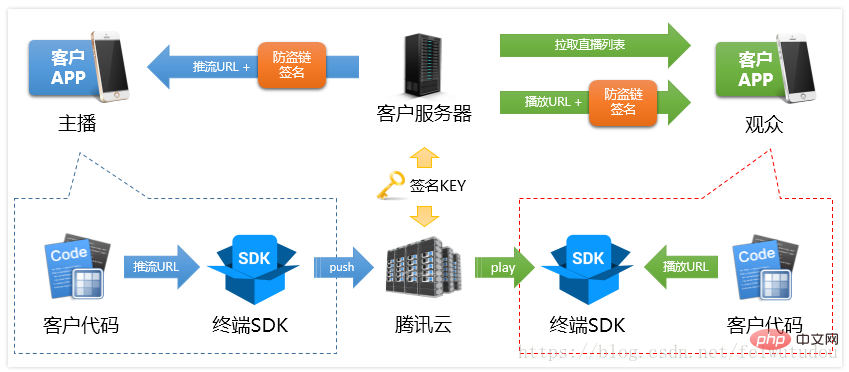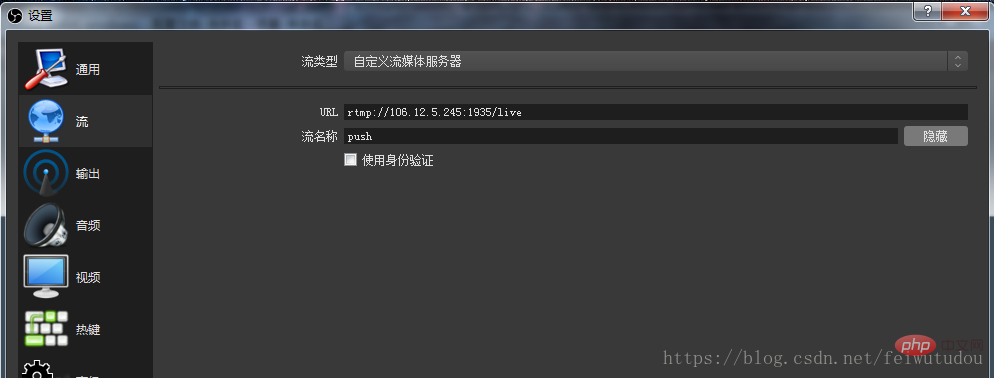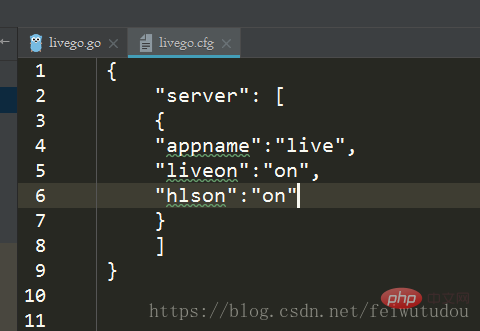 Backend Development
Backend Development
 Golang
Golang
 Teach you to use golang to implement live broadcast and on-demand functions
Teach you to use golang to implement live broadcast and on-demand functions
Teach you to use golang to implement live broadcast and on-demand functions
The following column golang tutorial will introduce to you how golang implements live broadcast and on-demand functions. I hope it will be helpful to friends in need!

1. Overview
When I first started doing live broadcasts, I was still a little confused. What is push-pull streaming? , I don’t understand the format protocol at all, and there are also endless third-party interfaces. In fact, to put it simply, as shown in the picture (stolen from Tencent Live API)

In fact, the so-called push streaming is that the client of the anchor stores the broadcast content we want on the server according to a specific process. Of course, what is shown here is Tencent Cloud. After the completion, it is transcoded by the communication cloud and then allowed to be watched by the audience (pull Take), I suggest friends who are not very clear about the basics to learn about it, it is still very convenient to understand.Tencent Cloud Portal
And what we use today is not Tencent, but written in golang Open source project livego, livego portal
2.livego
To be honest, there are quite few documents. I guess the author is busy with work. I am also simple here. However, I have to mention a small bug. It is probably a problem with the go version. In go1.10, there is an error. Two values are returned, but only one is written there (I can’t remember exactly where. "")
Let’s start with the rest. After setting up the environment,Start the service: execute the livego binary file to start the livego service That’s it
3.OBS
This is the standard configuration for live broadcast. I won’t go into the process. I will just say that I encountered it. The pit, as shown in the picture:

When I set up the push flow, I really didn’t know what the flow name was. I searched for a long time and experimented for a long time. Only then did I understand that if the address you have to connect to is rtmp://106.12.5.245:1935/live/push, and the live.cfg in livego is like this:

This is the same as the LIVE of AppName is the same as the LIVE in RTMP: //106.12.245: 1935/LIVE. The push address must be: rtmp://106.12.5.245:1935/livego, and the stream name can be filled in casually, as long as it is not empty. For example, if I fill in push here, then the page I will pull is :
rtmp://106.12.5.245:1935/live/push
http://106.12.5.245:7001/live/ push.flv
http://106.12.5.245:7002/live/push.m3u8
The above is the detailed content of Teach you to use golang to implement live broadcast and on-demand functions. For more information, please follow other related articles on the PHP Chinese website!

Hot AI Tools

Undresser.AI Undress
AI-powered app for creating realistic nude photos

AI Clothes Remover
Online AI tool for removing clothes from photos.

Undress AI Tool
Undress images for free

Clothoff.io
AI clothes remover

AI Hentai Generator
Generate AI Hentai for free.

Hot Article

Hot Tools

Notepad++7.3.1
Easy-to-use and free code editor

SublimeText3 Chinese version
Chinese version, very easy to use

Zend Studio 13.0.1
Powerful PHP integrated development environment

Dreamweaver CS6
Visual web development tools

SublimeText3 Mac version
God-level code editing software (SublimeText3)

Hot Topics
 How to safely read and write files using Golang?
Jun 06, 2024 pm 05:14 PM
How to safely read and write files using Golang?
Jun 06, 2024 pm 05:14 PM
Reading and writing files safely in Go is crucial. Guidelines include: Checking file permissions Closing files using defer Validating file paths Using context timeouts Following these guidelines ensures the security of your data and the robustness of your application.
 How to configure connection pool for Golang database connection?
Jun 06, 2024 am 11:21 AM
How to configure connection pool for Golang database connection?
Jun 06, 2024 am 11:21 AM
How to configure connection pooling for Go database connections? Use the DB type in the database/sql package to create a database connection; set MaxOpenConns to control the maximum number of concurrent connections; set MaxIdleConns to set the maximum number of idle connections; set ConnMaxLifetime to control the maximum life cycle of the connection.
 Comparison of advantages and disadvantages of golang framework
Jun 05, 2024 pm 09:32 PM
Comparison of advantages and disadvantages of golang framework
Jun 05, 2024 pm 09:32 PM
The Go framework stands out due to its high performance and concurrency advantages, but it also has some disadvantages, such as being relatively new, having a small developer ecosystem, and lacking some features. Additionally, rapid changes and learning curves can vary from framework to framework. The Gin framework is a popular choice for building RESTful APIs due to its efficient routing, built-in JSON support, and powerful error handling.
 What are the best practices for error handling in Golang framework?
Jun 05, 2024 pm 10:39 PM
What are the best practices for error handling in Golang framework?
Jun 05, 2024 pm 10:39 PM
Best practices: Create custom errors using well-defined error types (errors package) Provide more details Log errors appropriately Propagate errors correctly and avoid hiding or suppressing Wrap errors as needed to add context
 How to save JSON data to database in Golang?
Jun 06, 2024 am 11:24 AM
How to save JSON data to database in Golang?
Jun 06, 2024 am 11:24 AM
JSON data can be saved into a MySQL database by using the gjson library or the json.Unmarshal function. The gjson library provides convenience methods to parse JSON fields, and the json.Unmarshal function requires a target type pointer to unmarshal JSON data. Both methods require preparing SQL statements and performing insert operations to persist the data into the database.
 How to solve common security problems in golang framework?
Jun 05, 2024 pm 10:38 PM
How to solve common security problems in golang framework?
Jun 05, 2024 pm 10:38 PM
How to address common security issues in the Go framework With the widespread adoption of the Go framework in web development, ensuring its security is crucial. The following is a practical guide to solving common security problems, with sample code: 1. SQL Injection Use prepared statements or parameterized queries to prevent SQL injection attacks. For example: constquery="SELECT*FROMusersWHEREusername=?"stmt,err:=db.Prepare(query)iferr!=nil{//Handleerror}err=stmt.QueryR
 Golang framework vs. Go framework: Comparison of internal architecture and external features
Jun 06, 2024 pm 12:37 PM
Golang framework vs. Go framework: Comparison of internal architecture and external features
Jun 06, 2024 pm 12:37 PM
The difference between the GoLang framework and the Go framework is reflected in the internal architecture and external features. The GoLang framework is based on the Go standard library and extends its functionality, while the Go framework consists of independent libraries to achieve specific purposes. The GoLang framework is more flexible and the Go framework is easier to use. The GoLang framework has a slight advantage in performance, and the Go framework is more scalable. Case: gin-gonic (Go framework) is used to build REST API, while Echo (GoLang framework) is used to build web applications.
 What are the common dependency management issues in the Golang framework?
Jun 05, 2024 pm 07:27 PM
What are the common dependency management issues in the Golang framework?
Jun 05, 2024 pm 07:27 PM
Common problems and solutions in Go framework dependency management: Dependency conflicts: Use dependency management tools, specify the accepted version range, and check for dependency conflicts. Vendor lock-in: Resolved by code duplication, GoModulesV2 file locking, or regular cleaning of the vendor directory. Security vulnerabilities: Use security auditing tools, choose reputable providers, monitor security bulletins and keep dependencies updated.





